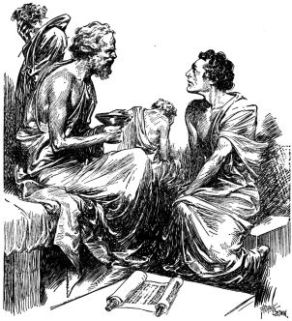I have been putting off this blog for as long as I possibly could, but I have to do it sometime. I have never been a big fan of Plato because his work, quite honestly, bores the heck out of me. I really struggled to get through Phaedrus, and I only understood about half of it. That being said, I find it interesting that Socrates does not like wiring because he believes it destroys memory. I could not disagree with him more. Writing helps me to remember things because it helps me to physically do something while I try to learn it. It also helps to visually see something while memorizing it. I do see his point that oral tradition can be destroyed through writing, but I think writing only benefits tradition. Throughout the years, oral tradition can be changed; this can be exemplified with the telephone game played by many kids. When stories or sentences are passed from person to person, someone will eventually confuse the words or add their own things to the story, thus allowing the story or sentence to be completely changed.
Richard Young and Patricia Sullivan touch on the subject of memory in Why Write? A Reconsideration. They have a lot of valid points, and I cannot disagree with them. They explain why writing is so imperative to our way of life and learning. Writing helps us explore in ways that we could not through traditional speech memory. Oral tradition and memorizing through speech was once a great way to learn, as Socrates suggests, but it is outdated. Writing helps us to learn, memorize, and work things out in ways that are more helpful and better suited to each individual.
I also found it interesting that Socrates says, “Writing, Phaedrus, has this strange quality, and is very like painting; for the creatures of painting stand like living beings, but if one asks them a question, they preserve a solemn silence. And so it is with written words; you might think they spoke as if they had intelligence, but if you question them, wishing to know about their sayings, they always say only one and the same thing.” He is saying that we can’t question writing, and, for the most part, this is true. We cannot go back in time and question authors about their writing and the meanings behind it; all we can do is try and analyze it to the best of our abilities. One major problem with not being able to ask questions about these author’s works is that people often misinterpret the meaning. It makes me wonder how much of the writing we read in school is a false interpretation.

